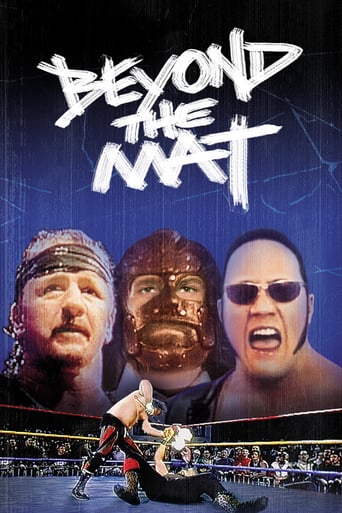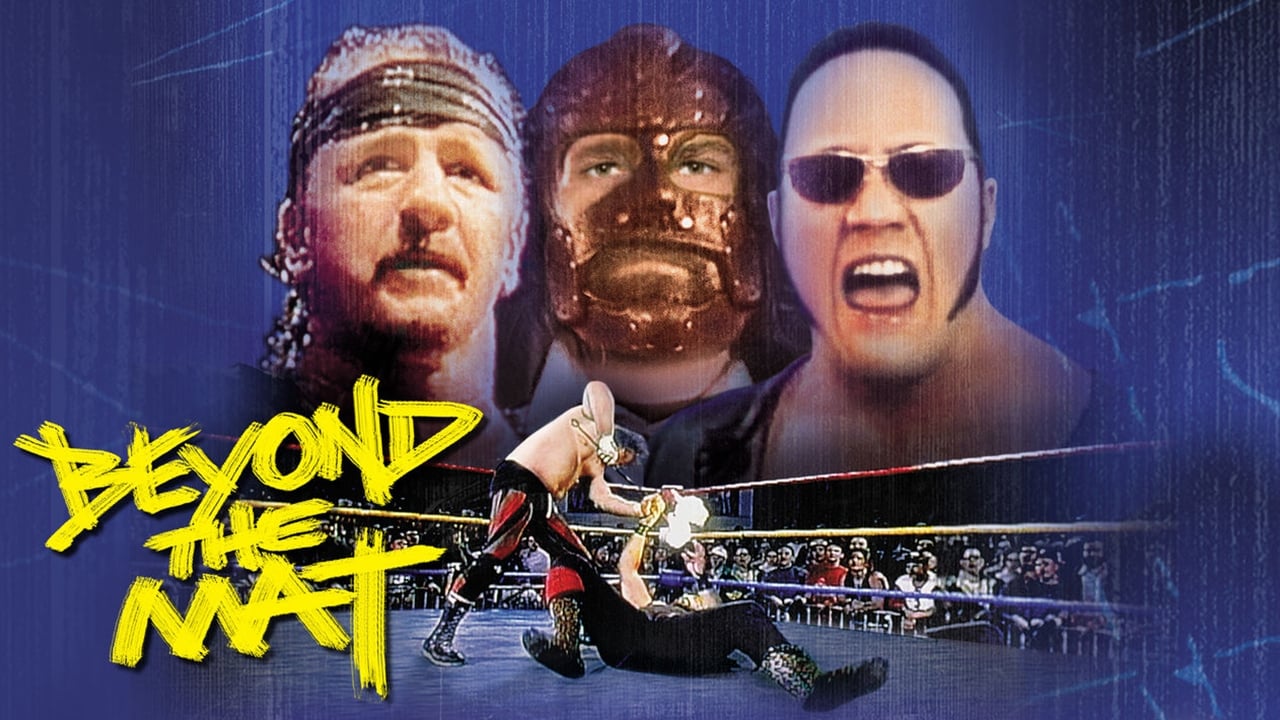deathadder-13878
I'm a casual wrestling fan, who's more interested in occasionally watching a YouTube clip out of nostalgia then in regularly following the sport. This documentary still was very compelling, though, because it examines some very fascinating and charismatic people. You don't need to know a thing about the business; the narrator himself doesn't refer to the more technical aspects and the doc. doesn't resort to the sports movie cliché of an athlete perfecting a move or style.The focus is primarily on several men who've achieved iconic status in wrestling. Their upbringing, their current status in wrestling, and the way they relate to family, fans, and other wrestlers. Terry Funk gets the lion's share of attention, understandably so since he's a rare example of a wrestler performing capably well into middle age (he was over 50 in the late 90's when this doc. was made). Funk helped pioneer a very gritty style. The fans grew to appreciate his spirit and skill (he and his opponents don't get seriously hurt, an essential part of being a good wrestler is making things look dangerous without getting hurt). Just the same, the years of competing have taken their toll on both Funk's body (a doctor says that he should barely be able to walk) and his family's patience. We're presented with his farewell match, in which he graciously loses to the younger but more famous Bret Hart, only to be told near the documentary's end that Funk found the paycheck, and the fan cheering, too tempting as he made a comeback just 3 months after the B. Hart match.More haunting is Jake the Snake Roberts. An enigmatic figure with an unforgettable gimmick (a python wrapped in a bag, ready to be unleashed on frightened opponents), his drug addiction and obviously stricken psyche have relegated him to the lowest level of wrestling. A performer known more for his personality than his athletic feats, he still can mesmerize a crowd and build a good rapport with his opponent. Out of the ring, he often speaks of the bleak loneliness of life on the road without any kind of steady relationships. We see him struggle through a meeting with his estranged daughter who fears that Jake will never fulfill his fatherly duties. Jake matter of factly relates his shocking background; being conceived in a rape, his sister being murdered, among other things. Will he overcome these things? No way to tell, especially after he goes on a drug binge and the concerned doc. crew can't find him.Amiable and somewhat spaced out, Mick Foley is a rather odd case. A top level performer for the biggest wrestling company (the WWF), his gimmick of being a glutton for punishment has led to the company pushing him harder and harder, eager to excite the fans and boost ratings. Foley himself encourages this push as we see youthful footage of Foley performing stunts. Bearded, missing several teeth, and with a thick mane of curls, he seems much older than he really is. A doting husband and father of several young children, it's quite distressing to watch his family endure a match in which Foley's head is lacerated open. In a post-match haze, Foley and the company boss reassure each other that the fans got what they wanted. Later on, when Foley watches his family's reaction to the match, he admits that for the first time he's concerned about his profession and the way it batters him. Unlike the majority of performers, Foley went on to retire (and stay retired) at a fairly young age. Several successful auto-biographical books helped him do it.We see shorter segments on other, less notable performers. A black wrestler named New Jack, with obvious tattoos and scars, who brags about being violent, goes to a Hollywood casting agency. We see him reciting a script with a male agent. Said agent enthusiastically praises New Jack. A woman agent is more grounded, saying that New Jack might be better cast as a "best friend" type. Well, have you seen New Jack in any big movies lately? A performer is signed by the WWF and given the gimmick of "puke", who is slated to be promoted based on his ability to vomit. Ultimately this didn't really go anywhere but the performer did go on to have moderate success as "Droz" (an abbreviation of his real name). Liked by his peers, his career was cut short after being paralyzed by a clumsy performer.Another study is two products of a California wrestling school which puts on amateurish shows. These two fellows are invited to perform and be evaluated at a WWF show. One is a soft spoken, rather thin and young black wrestler. He's told by the WWF to upgrade his build and get a better costume. The other wrestler, a very muscular and older white guy who is an airline mechanic when not pursuing his dream, fares better. The WWF and the crowd likes his aggressive attitude and technical skill. We're not told if the WWF ever signed either one, leaving us with uncertainty as is often the case in wrestling. The wrestling school manager tells students upfront that pay is minimal outside of the biggest promotions and few ever make it big.After examining the ups and downs of the business, the director, a life-long fan of wrestling, admits that he's still drawn to the spectacle but still can't explain why. Perhaps it's the sincere admiration that both crowds and performers have for the best competitors. The backstage footage of wrestler camaraderie and of the efforts put into shows by so many down to the crews that put rings together, string up the lights and speakers, and choreograph and evaluate the way that wrestlers are used are a testament to a thankless profession.
Tss5078
Adult professional wrestling fans aren't stupid, we know wrestling is fake and the outcomes are pre-determined. What none fans don't realize is why we like it. It's the drama, the pageantry, the cheesy stories, the costumes, and most of all the action. Yes, it's pre-determined and choreographed, but you still need to be charismatic and athletic, and night after night these guys put their bodies on the line just for our entertainment. People have been killed and paralyzed doing this, so to anyone who says it's not real and takes no skill, I point to this documentary. Beyond The Mat looks into the lives of these guys outside the ring and show the ancient Terry Funk, whose body has been ravaged from years in the ring. He can barely walk anymore, but still has to get in there and has to do this because it's all he knows and what he loves. Jake "The Snake" Roberts is also featured and he talks about how eight years on the road with WWE and how it made him a neglectful father, a bad husband, and a drug addict. Roberts says between the pain and the constant moving around he could never have done it without drugs! Finally, they look at Mick Foley AKA Mankind, Dude Love, Cactus Jack and show how he's this normal family man and while his family knows it's for show, how much they worry. In the last 30 years, hundreds of pro-wrestlers have died under the age of 45, most of them due to the physical trauma they've put their bodies through or the dependence on drugs that has resulted from it. If those were NFL or MLB stars instead, there would be massive reform and congressional intervention, but the truth is no one cares about these guys, except of course their families, friends, and fans. Beyond The Mat is important because it shows just what these guys put on the line and just how little the people at the top care.
hailsabin247
Being a gigantic wrestling fan, I couldn't wait to see this movie when it came out and it didn't disappoint. It is a great movie for fans and people who have never seen wrestling before. It is more of a documentary of the families of the men in the film than it is about wrestling. It seems that wrestling takes a back seat to the respective men's family lives. Barry Blaustein does an incredible job of editing, especially the scene with Mick Foley at the Royal Rumble 1999 when the lights go out and that song (whose name escapes me now but goes "When the light has gone...") plays and you truly see that wrestlers are more than guys in tights. You see that they are actually men who have families that care about them very much. While Beyond the Mat is good, I would have to say that it is not the best wrestling movie ever made. I would have to give those honors to Hit-man Hart: Wrestling with Shadows. If you want a good wrestling movie, watch Beyond the Mat. If you want a better wrestling movie, watch Hit-man Hart.
Ronald W. Baldwin
I have been a Wrestling fan for years...but, have recently stopped watching. This was due in part to the fact that I like the "Old School" Wrestling style of the 1970's...and didn't really like the new crap they had been throwing at us since the mid-90's. I was a Wrestling Manager in several "Outlaw" shows in the mid-90's...so I knew some of the inside...tricks and such. But, this movie was so insightful. It was wonderful all around. The Terry Funk segment is great and The Jake Roberts section....will make you cry...and the Mick Foley segment will make you ask "why" over and over again. The flick was so great that I watched it twice in a matter of just a couple of days. The only thing that made it a 9 instead of a 10...was the fact...that in my assessment...it ran about 30 minutes too long....and "drug" in spots....but, all in all...you've got to see it.


 AD
AD



